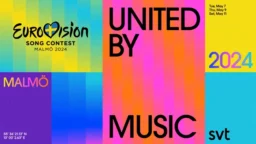The first six lines of My sister’s crown are in Czech, and so is the penultimate one. In between: an almost three-minute Slavic storm in four different languages. A spring storm in May, sung by the six-headed goddess of spring and fertility. This is Vesna, the entry from Czech Republic for the Eurovision Song Contest 2023.
Sometimes it’s nice not to know beforehand what a song is about. You can then give it your own interpretation, relate it to your own life, and the intentions of the lyricist(s) don’t have to be all-determining. And sometimes you don’t get that space. Upon the release of their song My sister’s crown for the Czech Eurovision pre-selection, the members of the group Vesna wanted to make it clear right away: this song is intended for our sister nation, for Ukraine.
We are not dolls
You really can’t ignore that. The parts that all of Europe can understand, because they are in English, also don’t beat around the bush. ‘My sister’s crown, don’t take it down’ — with that crown, Vesna explains, they means sovereignty. And no one has the right to take that sister’s sovereignty away. ‘Nobody has the right to do it.’
After mentioning that ‘she’, that sister, now a ‘we’ appears, a ‘you’ and a ‘you all’. Pull back your hands, the women sing, because we don’t want more boys dead. We are not your dolls, and lives are not banknotes that you can endlessly pull out of your wallet. You can’t keep stealing our souls.
Slavic languages
Vesna’s message is clear: against war, against bloodshed, and against taking away someone’s independence. Yet the message is not one-dimensional, partly because My sister’s crown is sung in no less than four languages. In addition to English, three different Slavic languages are heard: Czech, Bulgarian and Ukrainian. They form a whole, but all four also have their own voice.
The Czech (from the opening) speaks with admiration about the sister: she won’t back down for you, she doesn’t listen to what you say, her heart is wild and she won’t let you tie her down.
The Bulgarian voice (from the chorus) asks if you want to give your hand, if you’ll join the other sisters’ swim, and that you don’t have to be afraid, because there’s no room for hate in the sea.
And the Ukrainian, finally, sings a hymn for the sister, the beautiful sister – strong you are, brave you are, the crown is yours, sister, you are the only one allowed to wear the crown.
Who is Vesna?
Vesna practically played the Czech pre-selection. They won both the Czech and international audience over by truly crushing the competition (more than twice as many points as the runner-up). The group has been around since 2016 and has achieved great success in Czech Republic and neighboring countries. There were performances on large stages and on TV, nominations for music awards, and a collaboration with the Czech National Symphony Orchestra. Vesna certainly does not come out of nowhere.
Goddess of spring
The fact that there are six powerful women on stage, and that the strong sister is being sung about, is no coincidence. Vesna is the name of a goddess in Slavic mythology. In the old stories in which she plays a role, she symbolizes spring, youth, the fertility of the land, and the power of women. So when lead singer Patricie and her five other band members (three from the Czech Republic, the others from Slovakia, Bulgaria, and Russia) chose that band name, it was for a reason, with a mission: to celebrate Slavic culture and the woman within it. Look at the titles of their first singles: Morana (the goddess of winter), Mokoš (goddess of autumn), Vesna (spring), and Živa (summer).
Political?
How will My sister’s crown fare on stage in Liverpool? Will their message come across? And does that message — like, for example, that of Let 3 from Croatia — have a political edge on the verge of what is acceptable for Eurovision standards? Or is the song simply a series of well-developed metaphors — also breathtakingly visualized in the video clip — that everyone can still make their own story from? The fact is that, just a few hours after the release, that very clip was no longer visible on Russian or Belarusian channels.
Fortunately, that does not apply to the rest of the world. We can all see and hear how the goddess Vesna sings and raps to us in no less than four languages, and will undoubtedly lead the Czech Republic to a great result at the Eurovision Song Contest 2023 in Liverpool.
Photo: Milan Vopálensky / Eurovision.tv






